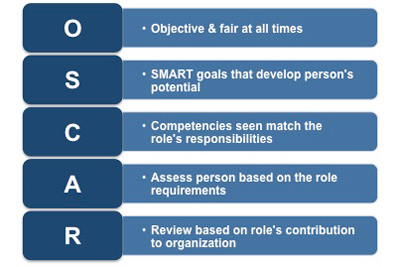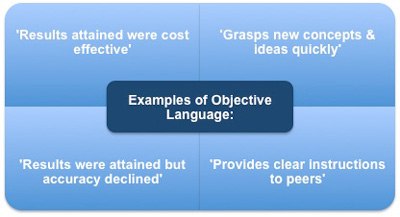OSCAR Principles of Performance Management
As a manager there are certain things you can do within the appraisal process to help you maximize engagement and encourage your team to attain high levels of performance:
- Be objective and fair in how you assess your staff at all times, regardless of your personal feelings.
- Set your staff SMART goals that will develop each person to their maximum potential.
- When observing your staff, assess them on the competencies they display according to the responsibilities of their role.
- Assess individuals based on the role and tasks as outlined in their job description.
- When you review an individual you should also assess their performance based on the role's contribution to the organization. It is vital that you check that the person has a clear understanding of how their input contributes to the organization's success.
You can use the mnemonic OSCAR to help you to remember these behaviors and incorporate them into the appraisal process.
 |
Always be Objective
Without a formal appraisal process in place, your relationship with a team member will tend to be subjective and based on 'how well things are going' at any particular time because people tend to place more emphasis on things that have happened recently, rather than over the past twelve months or so.
In addition, even the most fair-minded person is biased towards people that they have a lot in common with. By being objective in all your dealings, regardless of your personal feelings, you will avoid the common pitfalls of 'favoritism' and a 'recency focus.' These are discussed in detail in 'avoiding rating bias'.
You should act as a mediator between your team member and your organization by providing the individual with a clear definition of their role, what actions they are required to perform, and how that function fits into the overall success of the organization.
In order to do this effectively, you must be seen to be completely objective in how you manage each individual's performance. Objective language is most effective when it has a direct correlation with the duties and tasks for which the employee is responsible. Performance should always be measured in relation to pre-existing standards as defined in the job description.
 |
One way to ensure that you are perceived as 'objective' is by using impartial language in all communications so that it is interpreted in the same way by most people. You want to avoid using subjective language as this reflects your personal opinion and is open to interpretation, meaning that information may be misinterpreted or show bias.
You may also be interested in:
Performance Management Cycle | Setting SMART Goals and Objectives | Matching Competencies to Roles | Performance Appraisal Role Description | Appraisal Process Steps | Stages of the Appraisal Process.
|
|
 |


